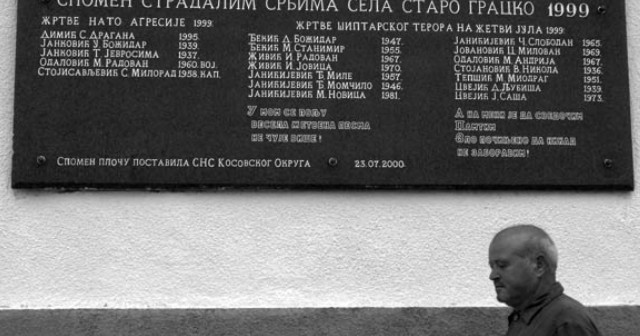The families of Serb farmers killed in Kosovo 18 years ago urged Belgrade to sue the NATO peacekeeping force and the UN Mission in Kosovo for not preventing the murders – although experts warned this would be difficult.
The Association of Families of Kidnapped and Murdered Civilians, Soldiers and Policemen in Kosovo asked Serbia to file charges against NATO’s Kosovo peacekeeping force, KFOR, and the UN Mission in Kosovo, UNMIK, for not protecting 14 Serb farmers who were murdered in Staro Gracko/Gracka e Vjeter in July 1999, just after the war ended.
“When someone loses their closest kin, of course they are entitled to compensation,” the lawyer for the association, Dragan Palibrk, told BIRN.
Palibrk argued that KFOR and UNMIK’s responsibility for providing security was clearly outlined in the provisions of the Kumanovo treaty, which ended the Kosovo war in June 1999, and UN Security Council Resolution 1244, which authorised the deployment of an international military presence.
He drew a comparison with a similar case, when the families of Srebrenica victims sued the Netherlands because Dutch UN peacekeepers did not prevent their deaths, and recently won the right to compensation.
However they failed to sue the UN itself, as the court in The Hague ruled that the international body has immunity from prosecution in all member countries.
Palibrk admitted that he was not clear which international court could be addressed over such a case, and that it was down to the Serbian state to accept the families’ wishes and initiate a suit.
He said that Serbia, and not the association of victims’ families, should be the party that sues, because the victims were Serbian citizens and because Belgrade signed the treaties that established the KFOR and UNMIK missions’ jurisdiction in Kosovo.
“You could hardly expect me and a couple of enthusiasts to challenge a powerful organisation, but when the state does, it’s a different matter. Our strength, legal and political, is symbolic compared to [the state of Serbia],” Palibrk said.
Milan Antonijevic from the Lawyers’ Committee for Human Rights, YUCOM, told BIRN that seeking compensation in this way would be difficult, although not impossible.
“Previous lawsuits brought against NATO or similar organisations didn’t yield results,” Antonijevic said, explaining that it is unclear which court would have jurisdiction in this matter.
He said that while a parallel can be drawn between this case and the Bosniak families’ lawsuit against the Netherlands, the Serb victims’ relatives “should not get their hopes up”.
“This is a lesson for the future. When missions [like KFOR and UNMIK]are established, their accountability also needs to be clearly defined,” Antonijevic said.
The massacre of 14 Serb farmers as they gathered for the harvest in a field outside the village of Staro Gracko/Gracka e Vjeter happened on July 23, 1999.
The week before, the farmers had asked for NATO military protection because they feared reprisals from Kosovo Albanians over Belgrade’s actions during the war.
Conscious that they would be easy targets while they were out gathering the harvest, locally-based British troops had agreed to organise special protection.
The patrols were scheduled to begin on June 24, but the killers struck the day before.
The case falls under the jurisdiction of the new Kosovo Special Court, which is operating from The Hague and will prosecute former Kosovo Liberation Army fighters for alleged crimes committed during and after the war.
The director of the Serbian government’s office for Kosovo, Marko Djuric, said that Belgrade will “seriously consider” the suggestion that the state should initiate a law suit.
“Serbia will continue to support the struggle of the families to find out the truth about the killers,” Djuric said.
On the anniversary of the killings last year, Kosovo President Hashim Thaci paid tribute to the murdered Serbs and said that everyone who committed crimes during the Kosovo war and afterwards should be punished, whatever their ethnicity.
“Crime is crime, whoever it is committed against or whoever committed it,” Thaci said.





